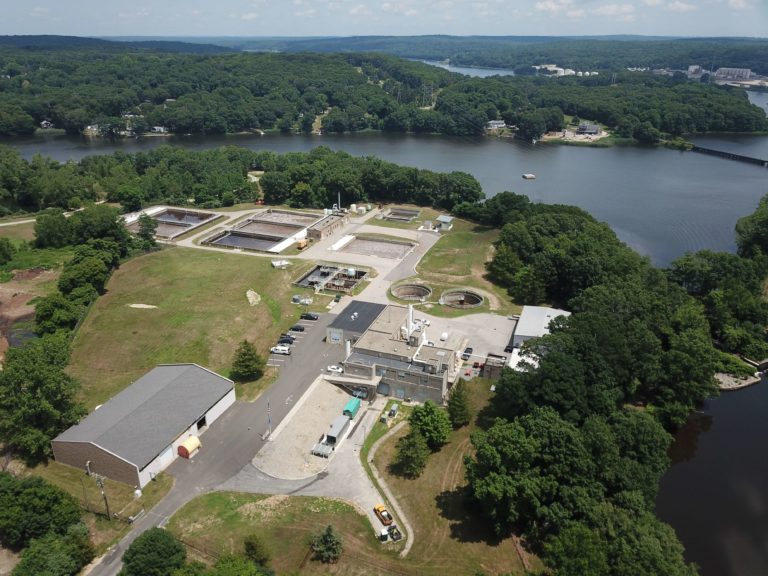The Governor placed the State in a State of Emergency on March 11 related to the COVID-19 outbreak. A WPCA contingency plan is in place in the event that there is a sudden reduction in employees attending work. None of the current Montville WPCF team has indicated symptoms at this time. The Superintendent has been monitoring information provided by the State as well as professional organizations regarding this novel coronavirus and how to best protect the workforce. OSHA reports that our current disinfection techniques will prove adequate to prevent transmission. The executive orders established by Governor Ned Lamont during the course of the COVID-19 pandemic were set to expire on September 9, 2020; however, the Governor will extend the Declaration of a Health Emergency for another five months. This means the executive orders already written will last through Feb. 9, 2021.
The Montville Treatment Plant will begin chlorine addition to the effluent on April 15, 2020 (early) for disinfection purposes.
Training and information exchanges are performed daily. We are reaching out during this unprecedented outbreak because we know many of you have questions. We recognize that this is an evolving issue and expect more guidance to be forthcoming in the days ahead. The most up-to-date information can be found at: https://portal.ct.gov/Coronavirus.
Currently, the COVID-19 virus has NOT been detected in drinking water, and there is no evidence that the virus can be spread to humans through water. The risk of transmission from the feces of an infected person is also unknown, but is expected to be low based on previous outbreaks of related coronaviruses. The CDC has released the following guidance on drinking water, recreational water and wastewater: https://www.cdc.gov/coronavirus/2019-ncov/php/water.html.
General guidance on sanitizing water treatment systems after a prolonged period of stagnation (such as during the recent COVID-19 shelter-in-place orders) is available on the website (see Information, Notices, CTDPH *Return to Service Guidance*). Stagnant conditions while buildings are unused may foul or plug water treatment systems. The guidelines concern general microbial fouling, not contamination from the COVID-19 virus. The guidance also suggests re-opening actions as part of an overall recommissioning plan for restaurants, small businesses/retail establishments, commercial facilities, industrial sites and manufacturing facilities.
The Governor’s office and the Department of Public Health are leading the state’s efforts in addressing the state-wide response. We will update this page as more information becomes available. The WPCA is also fully supportive of the State’s moratorium on utility service terminations for residential customers for non-payment, following Governor’s Declaration of Public Health and Civil Preparedness Emergencies. Going forward, residential customers who are unable to pay their water utility bills will not have their utility service turned off.
Mayor Ronald McDaniel has declared a local civil preparedness emergency in the Town of Montville as a result of the global pandemic of the COVID-19. Under the Town of Montville’s Emergency Operation Plan, the Town of Montville Emergency Operations Center will be opened and activated. The EOC supports the mayor, assisting him to make executive/policy decisions, coordinating inter agency relations, dispatching and tracking resources and collecting, analyzing and disseminating information. The EOC is in operation on a 24 hour basis.
Contact Information: Town of Montville Emergency Operation Center: 860-848-6781
Town of Montville Emergency Dispatch Center: 860-848-3974
No payments will be accepted in person at the WPCF for the near future. Payments will be accepted over the phone or on line with a Visa, Mastercard, or Debit card. Delinquent accounts fees may be applicable. Additionally, no permit applications will be accepted. Septage receiving will be ongoing during business hours. The public can communicate via the Superintendent (dalbertson@montville-ct.org) if there are questions.
***The Superintendent is urging all ratepayers to refrain from flushing disinfectant wipes (including those labeled “flushable”) or rags – and instead, to dispose of them in the trash. In addition to causing clogs and wastewater collection system overflows, flushing wipes can also lead to sewer back-ups in basements and damage wastewater treatment equipment. During a time when we’re washing our hands and wiping down surfaces more frequently, the WPCF is being affected by the disposal of wipes into sewage systems. We can all do our part and help avoid sewer overflows by disposing of these wipes in the trash rather than flushing them away. Restaurants owners that are now closed are advised to unplug their grease removal units. (AGRUs)***
***Please go to Information “Notices” for the WPCA COVID-19 Contingency Plan (2020) and for list of Non Flush-able Items***
